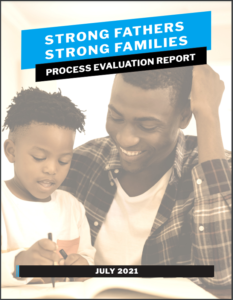2021 Strong Fathers Strong Families Evaluation Report
 The 2021 Strong Fathers Strong Families Evaluation Report provides an overview of the program, summarizes the literature on fatherhood involvement, and describes the research activities, key findings, and a proposed plan for future program evaluation.
The 2021 Strong Fathers Strong Families Evaluation Report provides an overview of the program, summarizes the literature on fatherhood involvement, and describes the research activities, key findings, and a proposed plan for future program evaluation.
The Annie E. Casey Foundation contracted with Texas Institute for Child & Family Wellbeing (TXICFW) to conduct a process evaluation of the Strong Fathers Strong Families Campus Program. The process evaluation aimed to understand the program experiences of participants and inform a proposed evaluation plan.
For this project, TXICFW conducted a literature review on fatherhood involvement. Researchers then developed a logic model based on the literature review, Strong Fathers program activities, and intended goals. Finally, researchers collected qualitative data through interviews of fathers and school staff at three Texas schools participating in Strong Fathers. Researchers used findings from the process evaluation to refine the logic model and develop an evaluation plan.
Key findings include:
1. Dads often enacted the role of provider and disciplinarian. In contrast, moms often enacted the role of caretaker, typically more engaged in children’s education and learning.
2. Dads’ time with children was largely dependent on work schedules. Work and busy family schedules were the most common barriers for dads participating in school activities, including Strong Fathers.
3. Dads felt most connected with children either during special activities or when working through stressful or emotional moments together.
4. Schools typically communicated with moms. Schools engaged dads only under special circumstances such as when discipline was needed and/or for dad-specific events.
5. Schools struggled to engage families from various cultures and backgrounds. School staff’s assumptions and biases about families may hinder this engagement.
6. Motivation to participate in school activities, including Strong Fathers, was typically dad-led or child-led. The father-child relationship ultimately drove participation.
7. Most dads and school staff reflected positively about Strong Fathers. However, dads who participated were typically already engaged in their children’s education and learning prior to participating in Strong Fathers.
